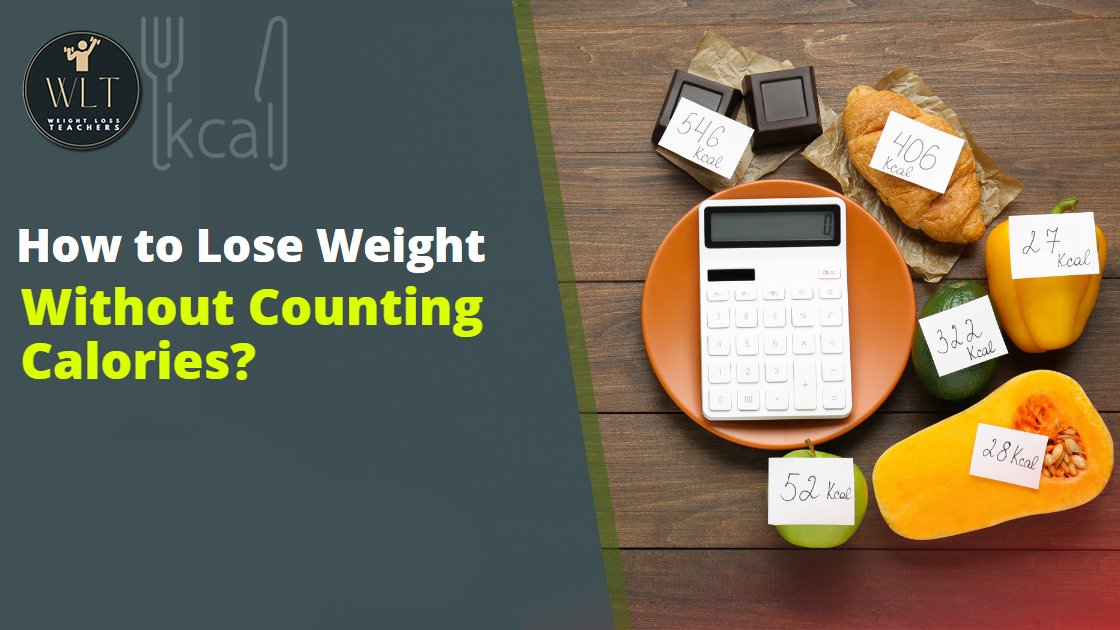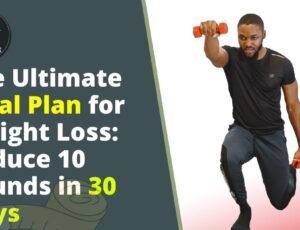
How to Lose Weight Without Counting Calories?

Losing weight can be a daunting task, and calorie counting adds another layer of difficulty. The good news is that you don’t have to monitor calories in order to lose weight. There are various efficient strategies for losing weight without tracking every calorie that enters your body.
Table of Contents
Introduction
This article will elaborate on the art of losing weight without calorie counting while mentioning a range of strategies that encourage long-term weight loss and overall health.

Mindful Eating
Mindful eating is a practice that helps us completely interact with our meals and connect with our hunger and fullness signals. In today’s fast-paced society, we often speed through meals, scarcely paying attention to what we’re eating or how much we consume. Overeating and weight gain might result from a lack of awareness. We may, however, interrupt this cycle, proceed to lose weight without calorie counting and build a healthier connection with food by practising mindful eating.
To begin eating consciously, create a tranquil and serene environment for your meals. Turn off all distractions, such as the television or smartphone, and make a separate area where you can concentrate completely on your eating. Take a moment to enjoy the look, smell, and texture of the meal in front of you. Chew gently and relish the aromas with each bite. Pay attention to your body’s physical sensations and impulses.
Eating thoughtfully trains your body to recognize hunger and fullness cues. You learn to discern between physical hunger and cravings caused by emotion or boredom. This self-awareness allows you to eat only when you are actually hungry, rather than when you are triggered by habit or emotion. It also enables you to know when you are full and prevent overeating.
Mindful eating improves your overall meal experience in addition to supporting healthy portion control. By totally immersing yourself in the moment, you may appreciate the intricacies of each dish, uncovering new flavors and textures that would have gone unnoticed previously.
This increased awareness can lead to higher satisfaction with smaller servings because each mouthful provides more pleasure.
Mindful eating is a slow and steady process that demands patience and persistence. It is not about following rigorous rules or imposing constraints, but about cultivating a thoughtful and intuitive attitude toward nourishing your body. You can build a lasting and joyful relationship with food that supports your weight loss objectives by appreciating the present moment and listening to your body’s demands.
Focus on Whole Foods

It’s easy to forget the importance of whole foods in our diets in a world of convenience and processed meals. Whole foods are minimally processed or refined foods that retain their natural condition and nutritional content. They are often high in vitamins, minerals, fiber, and antioxidants and hence provide important nutrients while also boosting overall health.
Prioritize fruits and vegetables when focusing on entire foods to lose weight without calorie counting. These brilliant and colorful foods are high in vitamins, minerals, and phytochemicals, which promote good health and well-being. They are also low in calories and high in fiber, which keeps you full and promotes healthy digestion during your quest to lose weight without calorie counting.
Whole grains like quinoa, brown rice, and whole wheat bread are also essential components of a whole-food diet. Whole grains, as opposed to refined grains, which have been stripped of their bran and germ, maintain their fiber, vitamins, and minerals. As a result, they are a more nutritious option that aids weight loss by providing continuous energy and decreasing the chance of overeating.
Incorporating lean protein sources into your meals is critical for weight loss and overall health. Excellent alternatives include skinless poultry, fish, tofu, lentils, and Greek yogurt. Protein is not only filling, but it also aids in the formation and repair of tissues, muscle growth, and metabolism.
Don’t overlook good fats, which are necessary for the absorption of fat-soluble vitamins and create a feeling of fullness. Choose avocados, almonds, seeds, and olive oil as sources of heart-healthy fats that support general well-being during your quest to lose weight with no calorie counting.
One of the benefits of focusing on whole foods is that they are inherently low in calories, making them an excellent food choice for losing weight without calorie counting. By focusing on whole meals, you provide your body with the nutrition it requires while automatically lowering your calorie intake. Furthermore, the high fiber content of whole foods aids with blood sugar regulation and digestive health and promotes a sensation of fullness, reducing excessive snacking or overeating.
Incorporating whole foods into your diet to lose weight without calorie counting necessitates a mental adjustment as well as a commitment to making healthier choices. Begin by progressively substituting whole meals for processed foods. Experiment with fresh recipes and flavors to learn how whole foods can add delight and variety to your meals. With time, you’ll develop a taste for the natural goodness of whole foods, resulting in long-term weight loss and enhanced overall health.
Increase Protein Consumption

Protein is a necessary macronutrient that aids in weight loss and overall wellness. Increasing your protein consumption might be an effective technique for losing weight without tracking calories.
One of the most important advantages of protein is its capacity to enhance satiety. Protein is more filling than carbohydrates and fats, so it can help reduce appetite and prevent overeating. Incorporating protein-rich foods into your meals and snacks helps you stay fuller for longer periods of time and reduces cravings, ultimately helping your weight loss efforts.
Protein has a larger thermic effect than other macronutrients, in addition to its satiating benefits. This means that your body expends more calories during protein digestion and absorption. You can modestly raise your metabolism by increasing your protein intake, resulting in higher calorie expenditure even at rest.
Furthermore, protein is essential for maintaining muscle mass when you are losing weight without calorie counting. When you limit your calorie intake, your body may burn down muscle tissue for energy, slowing your metabolism. Protein provides your body with the building blocks it requires to maintain and rebuild muscular tissue. Muscle mass preservation is crucial because muscle is metabolically active and burns more calories than fat, even at rest. Increase your protein consumption to boost your metabolism, burn more calories, and encourage long-term weight maintenance.
Incorporate protein-rich foods into your meals and snacks to enhance your protein intake. Skinless poultry, fish, eggs, Greek yogurt, lentils, tofu, and cottage cheese are all good sources of protein. By including these foods in a well-balanced diet, you not only support your weight loss objectives, but you also offer your body the nutrition it requires to thrive.
While protein is useful for weight loss, it should be ingested as part of a well-balanced diet. The idea is to strike a balance between protein, carbs, and healthy fats while keeping your overall calorie consumption in line with your weight loss objectives. To determine the optimum protein consumption for your specific needs and preferences, see a healthcare practitioner or a qualified dietitian.
Intermittent Fasting
Intermittent fasting has grown in popularity among people seeking effective solutions about how to lose weight without counting calories. It is an eating habit that alternates between fasting and eating at regular intervals. Intermittent fasting offers various potential benefits for weight loss and overall health by leveraging the power of time-restricted eating.
The 16/8 technique, which entails fasting for 16 hours and limiting food to an 8-hour window each day, is a popular type of intermittent fasting. During the fast, only calorie-free beverages such as water, herbal tea, and black coffee are permitted. This fasting period helps your body use stored fat for energy, which results in weight loss over time.
One of the key reasons intermittent fasting is helpful for weight loss is its effect on calorie consumption overall. People naturally consume fewer calories when their eating window is reduced because they have less time to eat. However, it is still vital to prioritize nutrient-dense, whole meals during the eating period to support overall health and well-being.
Intermittent fasting also affects hunger and metabolic hormones. It can aid in the regulation of insulin levels, the improvement of insulin sensitivity, and the promotion of fat burning. It has also been demonstrated to boost levels of human growth hormone (HGH), which can help with muscle preservation and fat loss.
In addition to weight loss, intermittent fasting has been linked to a number of other health advantages. According to research, it may improve blood sugar control, reduce inflammation, improve brain function, and boost cellular repair mechanisms in the body. However, intermittent fasting should be approached carefully and in consultation with a healthcare expert, especially if you have underlying health concerns or are on medication.
Low Carb Diet
Another technique that has proven beneficial for losing weight without calorie counting is a low-carb diet. This diet reduces carbohydrate consumption, particularly refined and processed carbs like sugar, white bread, and pasta, while increasing the intake of healthy fats and lean proteins.
The main idea behind a low-carb diet is that by limiting carbohydrates, the body enters a state of ketosis. Ketosis is a metabolic condition in which the body begins to use stored fat for fuel rather than glucose from carbs. Over time, this can result in significant weight loss.
Low-carb diets help stabilize blood sugar levels, minimize insulin surges, and lessen cravings for sugary and starchy meals by restricting carbohydrates. This can lead to better hunger control and lower calorie intake without the need for calorie counting. Furthermore, low-carb diets frequently involve increased protein consumption, which increases satiety and aids in the preservation of muscle mass during weight loss.
Furthermore, a reduced-carb diet can improve a variety of health indicators. According to research, it can lower triglyceride levels, boost high-density lipoprotein (HDL) cholesterol levels, and improve insulin sensitivity markers. These modifications can lower the risk of chronic illnesses, including heart disease and type 2 diabetes.
A low-carb diet usually focuses on whole, unprocessed foods, including lean meats, fish, eggs, vegetables, nuts, and seeds. It urges people to avoid refined carbohydrates, fizzy drinks, and processed foods. A low-carb diet delivers critical vitamins, minerals, and fiber while limiting carbohydrate intake by focusing on nutrient-dense foods.
It’s crucial to remember that a low-carb diet isn’t for everyone, especially those with specific medical issues or dietary limitations. Before making significant dietary changes to lose weight without calorie counting, always consult with a healthcare practitioner or a qualified nutritionist.
Reduce Consumption of Processed Foods
Processed meals have become a mainstay in many diets in our fast-paced modern culture. These foods are often heavy in calories, added sugars, bad fats, and sodium, and they frequently lack important nutrients. Depending on processed foods can result in weight gain and a number of health problems. By limiting your consumption of processed foods, you can dramatically lower your calorie intake without having to count them.
Processed foods frequently lack the nutritional benefits that whole, unprocessed foods provide. During the refining process, they are often stripped of fiber, vitamins, and minerals. As a result, despite consuming a large number of calories, they give little satisfaction, leaving you feeling hungry and unsatisfied. This can result in overeating and trouble controlling your weight.
Furthermore, processed foods contain a lot of added sugars, which lead to weight gain and raise the risk of chronic diseases like obesity, type 2 diabetes, and heart disease. You may reduce your intake of these added sugars and create a healthier environment for weight reduction by lowering your consumption of processed meals.
Instead of relying on processed foods, as previously indicated, focus on including whole foods in your diet. Whole foods supply necessary nutrients, fiber, and satiety, allowing you to feel full while eating fewer calories. You may nourish your body with beneficial ingredients and help your weight loss journey by substituting commercial snacks with fresh fruits, veggies, nuts, or homemade alternatives.
It is crucial to understand that cutting back on processed meals does not imply eliminating them entirely. Moderation is crucial, and occasionally indulging in your favorite processed foods can still be part of a healthy lifestyle. The goal is to make whole, unprocessed foods the foundation of your diet, with them accounting for the majority of your meals and snacks.
Drink Plenty of Water

Proper hydration is often disregarded when it comes to weight loss, yet it plays a crucial role in your efforts to lose weight without calorie counting. Drinking plenty of water is a simple yet effective method for achieving your weight loss goals without having to calculate calories.
Water is required for several body functions, including digestion, metabolism, and nutrient delivery. Staying hydrated optimizes these processes, ensuring your body performs properly and promoting good weight management.
Water consumption before meals can be especially effective for weight loss. Water consumption before a meal may lower calorie intake by encouraging a feeling of fullness, according to research. Filling up on water allows you to eat less during the meal, which helps reduce portion sizes and overall calorie intake.
Water is also a calorie-free substitute for sugary beverages. Many popular beverages, including sodas, fruit juices, and energy drinks, are high in sugar and calories. By substituting water for these sugary drinks, you eliminate unneeded calories from your diet and encourage healthier hydration.
Water, in addition to decreasing appetite, aids in thermogenesis, the process through which the body burns calories to generate heat. Drinking cold water increases calorie expenditure slightly as your body strives to reheat it to body temperature. While the effect is minor, every little bit helps when it comes to losing weight.
Carry a reusable water bottle with you and make it a habit to drink water often to stay hydrated throughout the day. Aim for eight glasses of water each day, or more if you are physically active or live in a hot climate. If drinking plain water is difficult for you, infuse it with fresh fruits or herbs to enhance flavor without adding calories or sugar.
Remember that water should be used in conjunction with a healthy diet and lifestyle. While it can help you lose weight without counting calories, it is not a cure-all. Proper hydration, combined with mindful eating, nutritious foods, and regular physical activity, will increase your chances of reaching your weight loss objectives.
Note: There might be affiliate links mentioned here. We may receive a commission if you purchase a product through an affiliate link. There is no additional charge for you. Please do your own research before making any online purchases.
Get Enough Sleep

Sleep is sometimes overlooked during the weight loss process, despite its importance to general health and well-being. Getting enough quality sleep is critical for weight management because it affects numerous hormones associated with hunger and satiety.
Sleep deprivation can upset the balance of hormones involved in hunger regulation. When you don’t get enough sleep, the hormone ghrelin increases, which drives appetite, while the hormone leptin drops, which signals fullness. As a result, you may have increased desires and cravings, making it difficult to make smart meal choices and keep your calorie consumption under control.
Inadequate sleep can also impair your body’s capacity to handle and metabolize carbs, resulting in insulin resistance and an increased risk of developing illnesses such as type 2 diabetes and obesity. Prioritizing quality sleep helps your body’s insulin sensitivity and promotes improved blood sugar regulation, both of which aid in weight management.
Establish a consistent sleep pattern and a soothing nighttime routine to improve your sleep for weight loss. Aim for seven to eight hours of uninterrupted sleep per night. Maintain a sleep-friendly environment in your bedroom by keeping it cold, dark, and quiet. Avoid using electronic gadgets before going to bed since the blue light they emit can interfere with your sleep-wake cycle.
Before bed, incorporate relaxation techniques such as meditation, deep breathing exercises, or moderate stretching to enhance better sleep quality. These exercises relieve stress and soothe the mind, allowing you to sleep well.
Remember that sleep is an active process that helps your body to mend, renew, and refresh. By making sleep a priority as part of your weight reduction journey, you will benefit your general health, well-being, and long-term success in reaching your weight loss goals.
Move More
Without monitoring calories, physical activity is a vital component of weight loss. Regular exercise burns calories, boosts metabolism, and promotes general health and well-being.
Many individuals equate exercise with long gym sessions or intensive workouts. Incorporating physical activity into your everyday routine, on the other hand, does not have to be difficult or time-consuming. Walking, cycling, swimming, and even gardening can make a huge difference in your journey to lose weight without counting calories.
The idea is to discover activities that you enjoy and fit into your schedule. By choosing activities that you enjoy, you are more likely to remain with them over time, resulting in long-term weight loss.
Incorporating extra activity into your everyday routine is one helpful method to lose fat without tracking calories. Rather than taking the elevator, take the steps. Park further away from your location and walk the additional distance. During the day, take short breaks to stretch or stroll around. These minor adjustments can add up to an increase in your daily calorie expenditure.
Consider adding both aerobic activities and strength training to your program to maximize the benefits of physical activity. Aerobic exercises that raise your heart rate and burn calories include brisk walking, jogging, and dancing. Strength training, which includes resistance exercises such as weightlifting or bodyweight exercises, aids in the development of lean muscle mass. Muscle tissue is metabolically active, which means it burns more calories even when resting, which aids in long-term weight management.
It’s critical to start slowly and listen to your body. Consult a healthcare expert before beginning a new fitness program to lose fat without tracking calories if you are new to exercising or have any underlying health concerns. They may advise you on appropriate activities and assist you in developing a safe and successful strategy that is in line with your weight loss objectives.
Remember that physical activity is more than simply a way to burn calories; it also has a variety of additional advantages, such as improved mood, greater energy levels, decreased stress, and improved overall physical and mental well-being. By incorporating physical activity into your weight loss plan, you not only help your body control its weight but also improve your entire quality of life.
Manage Your Stress

Stress has a significant impact on our overall health and well-being, as well as our capacity to manage our weight. When we are stressed, our bodies create cortisol, a hormone that can cause an increase in appetite and a desire for high-calorie comfort foods. Furthermore, stress can interfere with sleep, reduce motivation for physical activity, and impair our ability to make good decisions.
Stress reduction is an important element of losing weight without calorie counting. By properly managing stress, you can foster a supportive environment for better habits and increase your overall well-being.
Mindfulness practices, such as meditation or yoga, are an effective way to alleviate stress. These techniques aid in the relaxation of the mind, the reduction of anxiety, and the promotion of a sense of peace and relaxation. Regular participation in these activities can help you manage stress better and make more informed diet and lifestyle choices to lose fat without tracking calories.
Another stress-reduction method is to engage in things that bring you joy and allow you to relax. Spending time in nature, reading a book, listening to music, practicing a hobby, or spending quality time with loved ones are all examples. You generate opportunities for stress release and self-care by including joyful activities in your routine.
Self-care is also essential for stress management. Taking care of your physical, mental, and emotional well-being reduces stress and helps you lose weight. Make sure you get adequate sleep, eat healthy food, and engage in activities that promote relaxation and self-care.
Seeking help from loved ones or professionals, in addition to these lifestyle choices, can be beneficial. Sharing your weight reduction journey’s struggles, concerns, and triumphs with a support network helps reduce stress while also providing accountability and encouragement.
You can create an atmosphere conducive to long-term weight loss and overall well-being by lowering stress and nurturing your mind and body. Remember that stress management is a lifetime process, and discovering solutions that work for you may necessitate some investigation and experimenting.
FAQs
Can you lose weight without tracking calories?
Yes, you can lose weight without tracking calories. You can lose weight without counting calories by practicing mindful eating, focusing on whole foods, increasing protein intake, reducing processed foods, drinking plenty of water, getting enough sleep, engaging in physical activity, and managing stress.
What exactly is mindful eating, and how does it aid in weight loss?
Mindful eating is the habit of observing your body’s hunger and fullness cues and eating carefully and without distractions. You can eat when you’re truly hungry and quit when you’re pleasantly full by practicing mindful eating. This helps prevent overeating and allows you to appreciate the flavors and textures of your food better.
Why should I concentrate on whole foods when trying to lose weight?
Whole foods, such as fruits, vegetables, whole grains, nuts, and seeds, are low in sugar and high in fiber and minerals. They provide you with a feeling of fullness and satisfaction while also providing important vitamins, minerals, and antioxidants. You fuel your body, minimize calorie intake, and help weight loss by focusing on nutritious foods.
How does increased protein consumption help with weight loss?
Protein has been shown to be more filling than carbs or fats. Increased protein intake makes you feel more filled and content, which might help you consume fewer calories overall. Furthermore, protein aids in the preservation of muscle mass during weight loss, which promotes a greater metabolism and the burning of more calories.
What are the advantages of intermittent fasting for losing weight?
By confining meals to specified time periods, intermittent fasting can help reduce overall calorie intake. It also regulates hunger and metabolism hormones, including insulin and human growth hormone (HGH), encouraging fat burning and weight loss. Furthermore, intermittent fasting has been linked to better blood sugar regulation, lower inflammation, and improved cellular repair mechanisms in the body.
How does a low-carb diet help with weight loss?
A low-carb diet restricts carbohydrate intake, causing the body to enter ketosis. In this state, the body uses stored fat for fuel rather than carbohydrates. A low-carb diet can enhance appetite control and minimize cravings while also regulating blood sugar levels, resulting in weight loss. It also improves measures of heart health and insulin sensitivity.
Do I have to fully exclude carbohydrates in order to follow a low-carb diet?
No, a low-carb diet does not necessitate the complete omission of carbohydrates. Instead, it emphasizes full, unprocessed foods while eliminating refined and processed carbs. The idea is to eat more veggies, legumes, and whole grains while limiting refined sugars and starchy carbohydrates.
If I have certain medical issues, can I engage in intermittent fasting or follow a low-carb diet?
Before beginning any new dietary plan to lose fat without tracking calories, contact a healthcare provider or qualified dietitian, especially if you have certain health conditions or are taking medication. They may offer tailored advice and guarantee that the strategy chosen is appropriate for your health needs and goals.
Are there any disadvantages or adverse effects to not monitoring calories when losing weight?
While calorie-free weight loss can be helpful, it is critical to listen to your body and promote a balanced diet. Rapid weight reduction or significant food restrictions might harm metabolism, vitamin deficiencies, and overall health. It is always best to achieve moderate, sustainable weight loss and to seek expert help when necessary.
How long will it take for these weight-loss procedures to produce results?
The rate of weight loss varies depending on several factors, including initial weight, metabolism, and adherence to the recommended strategy. It is critical to see weight loss as a long-term effort rather than expecting quick results. Weight loss that is gradual and sustainable is often more helpful and easier to maintain over time.
Conclusion
To summarize, reducing weight without counting calories is not only possible but also attainable through a variety of successful approaches. You can successfully commence your weight reduction journey by embracing mindful eating, focusing on whole foods, increasing protein intake, minimizing processed foods, drinking lots of water, getting adequate sleep, engaging in regular physical activity, and managing stress.
Mindful eating encourages you to become more aware of your body’s hunger and fullness cues, establishing a healthier connection with food and preventing overeating. Choosing whole meals ensures that your body receives important nutrients, fiber, and satiety, allowing you to feel content while consuming fewer calories. Increasing your protein consumption helps to maintain muscle mass while also increasing your metabolism, which aids in weight loss. Cutting back on processed meals lowers calorie intake and improves diet quality.
Water not only keeps you hydrated, but it also helps you feel full and aids your body’s natural detoxification process. Prioritizing adequate sleep helps regulate hunger hormones and promote healthy weight management. Physical activity, whether through planned exercise or adding movement into your regular routine, aids in the burning of calories, increasing metabolism, and improving overall well-being. Finally, stress reduction through mindfulness techniques, self-care, and getting help contributes to healthier lifestyle choices and a more balanced existence.
It’s critical to remember that losing weight is a journey that takes time, persistence, and a long-term commitment to a healthy lifestyle. There is no such thing as a one-size-fits-all solution, and what works for one individual may not work for another. Listen to your body, respect your specific needs, and make modifications as needed to lose fat without tracking calories.
While these strategies can assist you in losing weight without counting calories, it’s important to note that if you have specific health conditions or are under the care of a healthcare professional, you should consult with them on how to lose weight without counting calories before making any significant changes to your diet or exercise routine.
Finally, finding a balance that works for you—one that encourages nourishment, enjoyment, and long-term habits—is the key to successful weight loss. By incorporating these tactics into your daily routine, you may embark on a rewarding and powerful journey toward a healthier weight and increased overall well-being. Remember that every small step matters, and with perseverance and drive, you can achieve your weight loss objectives and become a healthier, happier version of yourself.
Disclaimer: The information provided in this article is for educational purposes only and should not be considered as a substitute for medical advice. Consult a healthcare professional before implementing any home remedies or making significant changes to your lifestyle.







